商务名片礼仪的介绍 英文 business card etiquette(课堂PPT)
- 格式:ppt
- 大小:2.05 MB
- 文档页数:25
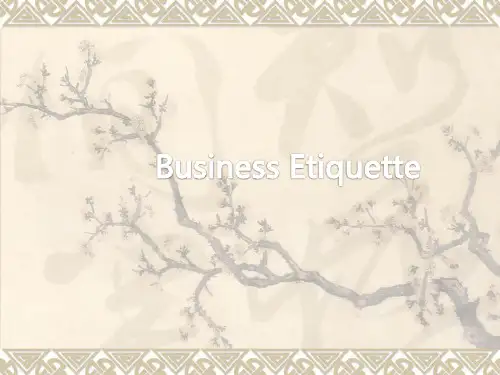
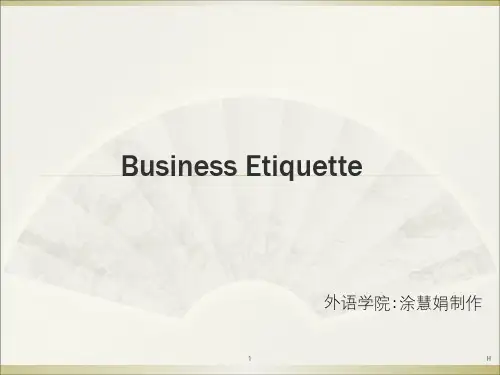
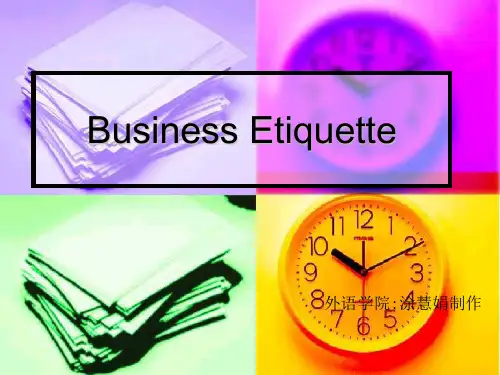
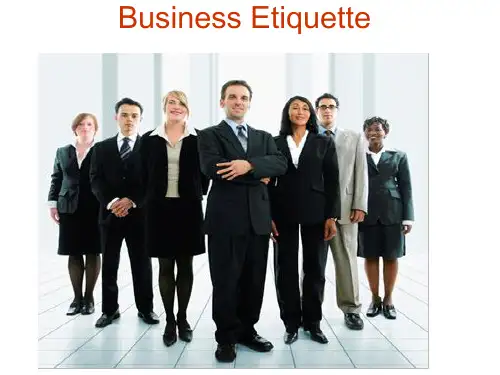
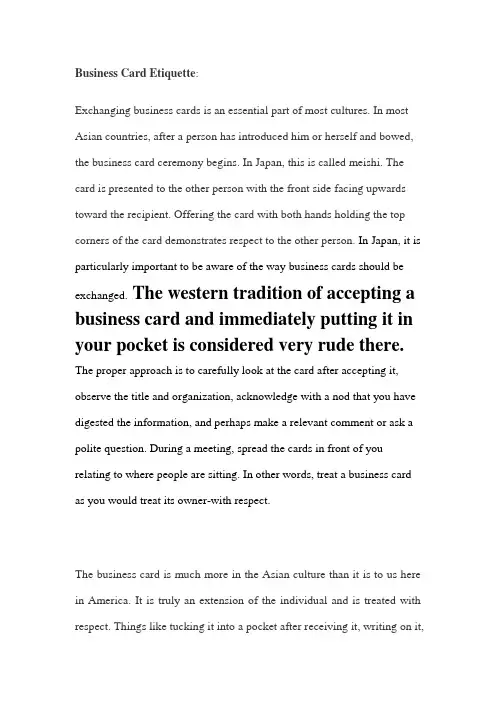
Business Card Etiquette:Exchanging business cards is an essential part of most cultures. In most Asian countries, after a person has introduced him or herself and bowed, the business card ceremony begins. In Japan, this is called meishi. The card is presented to the other person with the front side facing upwards toward the recipient. Offering the card with both hands holding the top corners of the card demonstrates respect to the other person. In Japan, it is particularly important to be aware of the way business cards should be exchanged.The western tradition of accepting a business card and immediately putting it in your pocket is considered very rude there. The proper approach is to carefully look at the card after accepting it, observe the title and organization, acknowledge with a nod that you have digested the information, and perhaps make a relevant comment or ask a polite question. During a meeting, spread the cards in front of you relating to where people are sitting. In other words, treat a business card as you would treat its owner-with respect.The business card is much more in the Asian culture than it is to us here in America. It is truly an extension of the individual and is treated with respect. Things like tucking it into a pocket after receiving it, writing on it,bending or folding it in any way, or even looking at it again after you have first accepted it and looked at it are not considered polite and can insult your fellow Asian networker.First encounterWhen European businessmen meet for the first time, they shake hands firmly. New participants in business interactions are introduced to the other persons present at the beginning of the first appointment.∙Titles, first names and last names are mentioned.∙In most European countries, such as Germany, France and Belgium, using courtesy titles and last names is the norm.∙In the UK and in the Netherlands it is not unusual to act on a first-name basis after the first introduction.Business cardsExchanging business cards is one of the most common ways of providing contact details.∙Business cards are usually exchangedat the beginning of the first meeting, so that each participant knows theposition of the others in thecompany.∙If a contact person is absent, alwaysleave a business card behind.∙In Europe, business cards are nothanded over with both hands, but it is not regarded impolite if one does so.CommunicationAlthough most European countries are similar in this matter, each nationality has its own way of communicating.∙Dutch businessmen keep business and private matters strictly separate. When negotiating they are very straightforward and to the point. A no-nonsense approach is used in business interactions and in society. A foreign businessman should not feel offended when a Dutchman says he is wrong.∙Businessmen from the United Kingdom and from Belgium are more careful. They will be very cautious in saying that they disagree and they need time to think things over.∙In Luxembourg first contacts are quite formal. For Luxembourgian businessmen it is important to know that the business partner is not passing through, but that he has chosen the country for itsindividual characteristics.∙In Germany and France people are more distant and formal. French people do not use first names, and one must persevere to gain their trust.∙Most Europeans have a good sense of humour. Laughing loudly and self-mockery is not considered as impolite.AppointmentsIn most European countries it is very important to be on time, but due to increasing traffic on the roads it occurs more often that people are delayed.∙Arriving late at a meeting can be regarded as an insult. Thus, any delay must be notified immediately.∙In France it is recommended to confirm appointments to be sure that the French business partners will be present.Business lunches and dinnersBusiness lunches and dinners form a crucial part of the business interaction process both in Europe and in China.∙Most Europeans enjoy dining sumptuously. Several courses and a significant amount of time may pass before business topics arebrought up.∙More informal relationships may be established during business lunches and dinners. Subjects for conversation are family life, culture, sports and politics.∙In Europe strict table manners are required. For instance, making noises while eating is considered very impolite.∙Most European countries have a diversified culinary culture supplemented with foreign cooking. There are, for instance, many Chinese restaurants. France is famous for its wine productionwhereas Belgium and Germany are known for their beer breweries.∙If one is invited for dinner at someone’s home, normally a small present is brought along. In that case, it is polite to send a letter of thanks the day after the dinner.LanguagesEnglish is widely spoken in all European countries, but each country is proud of its own national language as well. Therefore, it might be interesting to know how to greet the other person in his own language. Sometimes business cards are translated into English and adapted to the style and usage of the country one is doing business with.An overview。

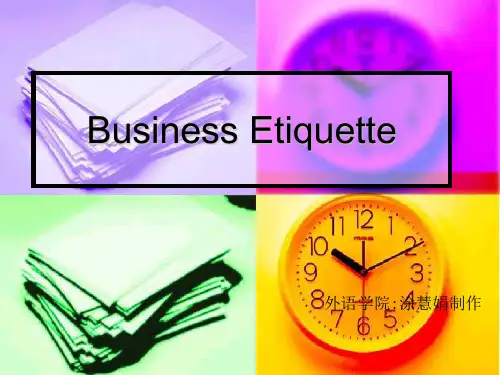
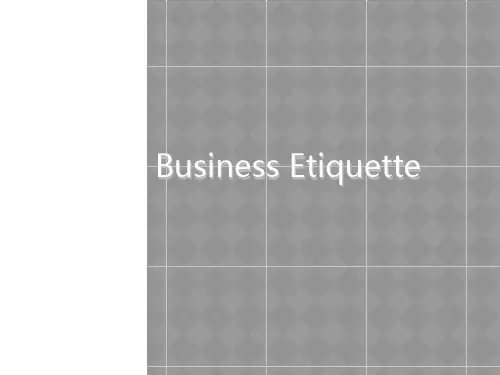
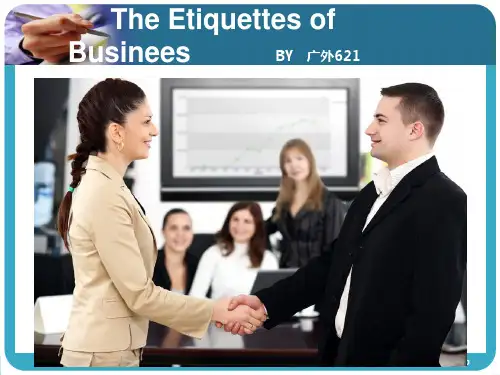
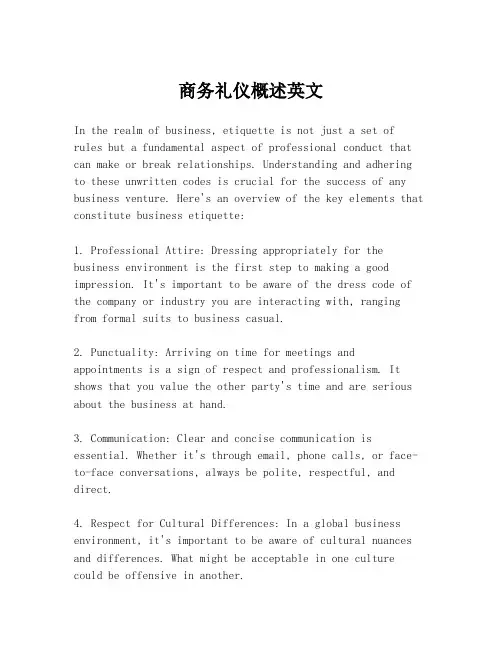
商务礼仪概述英文In the realm of business, etiquette is not just a set of rules but a fundamental aspect of professional conduct that can make or break relationships. Understanding and adhering to these unwritten codes is crucial for the success of any business venture. Here's an overview of the key elements that constitute business etiquette:1. Professional Attire: Dressing appropriately for the business environment is the first step to making a good impression. It's important to be aware of the dress code of the company or industry you are interacting with, ranging from formal suits to business casual.2. Punctuality: Arriving on time for meetings and appointments is a sign of respect and professionalism. It shows that you value the other party's time and are serious about the business at hand.3. Communication: Clear and concise communication is essential. Whether it's through email, phone calls, or face-to-face conversations, always be polite, respectful, and direct.4. Respect for Cultural Differences: In a global business environment, it's important to be aware of cultural nuances and differences. What might be acceptable in one culture could be offensive in another.5. Networking: Building and maintaining professional relationships is vital. This involves remembering names, following up on meetings, and networking events where you can expand your professional circle.6. Table Manners: When dining with clients or colleagues,it's important to be aware of table manners. This includes knowing which utensil to use and how to behave during the meal.7. Gift Giving: In some cultures, it's customary to exchange gifts. It's important to know the appropriate type of giftand the manner in which it should be presented.8. Confidentiality: Respecting the privacy andconfidentiality of business information is paramount. This includes not sharing sensitive information without permission.9. Digital Etiquette: With the rise of digital communication, it's important to follow digital etiquette. This includes not overusing emojis or abbreviations in professional emails and being mindful of the tone of your messages.10. Meeting Etiquette: During meetings, it's important to be prepared, to listen actively, and to contributeconstructively to the discussion.11. Body Language: Non-verbal communication is just as important as verbal. Maintain eye contact, avoid fidgeting, and ensure your body language is open and welcoming.12. Follow-up: After meetings or events, it's courteous to follow up with a thank you note or email. This shows appreciation and helps to solidify the relationship.By mastering these aspects of business etiquette, you can navigate the professional world with confidence and grace, fostering positive relationships that can lead to long-term success.。
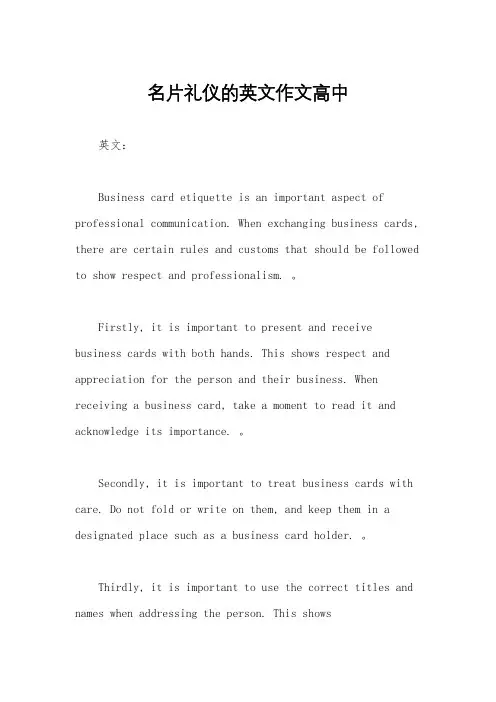
名片礼仪的英文作文高中英文:Business card etiquette is an important aspect of professional communication. When exchanging business cards, there are certain rules and customs that should be followed to show respect and professionalism. 。
Firstly, it is important to present and receive business cards with both hands. This shows respect and appreciation for the person and their business. When receiving a business card, take a moment to read it and acknowledge its importance. 。
Secondly, it is important to treat business cards with care. Do not fold or write on them, and keep them in a designated place such as a business card holder. 。
Thirdly, it is important to use the correct titles and names when addressing the person. This showsprofessionalism and attention to detail. 。
In addition, it is important to follow up with a thank-you note or email after receiving a business card. This shows appreciation and can help to build a professional relationship. 。
名片礼仪英文作文Title: Business Card Etiquette。
In the realm of professional interactions, businesscard exchange serves as a significant gesture of respectand communication. Understanding the nuances of business card etiquette is crucial for fostering positive relationships and leaving lasting impressions in various professional settings.First and foremost, it's essential to comprehend the cultural significance attached to exchanging business cards. In many cultures, particularly in East Asian countries like Japan, China, and South Korea, presenting and receiving business cards is a ritualistic practice steeped intradition and respect. Therefore, when engaging in international business dealings, it's imperative to beaware of and respectful towards the specific customs of the respective culture.The proper way to exchange business cards involves a series of steps that demonstrate courtesy and professionalism. Upon meeting someone new in a business context, it's customary to offer your business card with both hands, presenting it face-up and with the text facing the recipient. This action signifies sincerity and respect for the individual you're engaging with. Likewise, when receiving a business card, accept it with both hands, take a moment to examine it, and express gratitude with a nod or a brief thank-you.Furthermore, it's crucial to handle received business cards with care. Refrain from immediately stuffing theminto pockets or bags; instead, take a moment to acknowledge the information on the card and demonstrate genuineinterest in the individual or company it represents. Additionally, avoid writing on or bending the card, as such actions can be interpreted as disrespectful.In today's digital age, where contact information can be easily exchanged via smartphones and email, some may question the relevance of physical business cards. However,the tangible nature of business cards offers a personal touch that digital exchanges lack. A well-designed business card can leave a lasting impression and serve as a tangible reminder of a meaningful encounter.Moreover, the information presented on a business card should be clear, concise, and up-to-date. Include essential details such as your name, job title, company name, contact number, email address, and website. Ensure that the font size is legible and that the design reflects your professional identity.In addition to the exchange itself, following up on a business card exchange is equally important. Send a follow-up email or message to express appreciation for the meeting and reaffirm your interest in further collaboration or communication. This step reinforces the rapport established during the initial encounter and sets the stage for future interactions.In conclusion, mastering the art of business card etiquette is more than just a formality; it's ademonstration of respect, professionalism, and cultural awareness. By adhering to established customs and treating each business card exchange with care and consideration, you can strengthen professional relationships, build trust, and leave a lasting impression in the competitive world of business.。